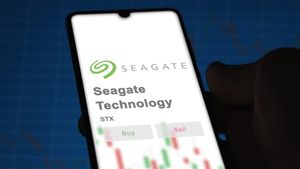
November 5, 2025 – Shares of IonQ (NYSE: IONQ), a leading pure-play quantum computing company, surged by an impressive 3.7% today, signaling robust investor confidence in its recent performance and future trajectory. This significant uptick comes on the heels of a series of pivotal announcements that underscore the company's accelerating momentum in the nascent yet rapidly evolving quantum computing sector. The market's enthusiastic reaction highlights a growing belief in the commercial viability and technological leadership of IonQ, sending a ripple of optimism across the entire quantum ecosystem.
The immediate catalyst for today's bullish movement was IonQ's exceptional third-quarter 2025 earnings report, which not only shattered revenue expectations but also led to an upward revision of its full-year guidance. Coupled with groundbreaking technological achievements and strategic acquisitions, the company has painted a compelling picture of rapid growth and innovation. This confluence of positive developments suggests that IonQ is not just participating in the quantum race but is actively setting the pace, attracting significant attention from investors keen on the next generation of computing.
IonQ's Quantum Leap: A Deep Dive into Recent Successes
IonQ's third-quarter 2025 financial results were nothing short of spectacular, with the company announcing a staggering $39.9 million in revenue, far exceeding its guidance of $26.98 million by an impressive 37%. This represents a phenomenal 222% year-over-year growth, demonstrating a rapidly expanding demand for its quantum computing solutions. In response to this stellar performance, IonQ has confidently raised its full-year 2025 revenue outlook to a range of $106 million to $110 million, reinforcing its optimistic growth projections.
Beyond financial triumphs, IonQ has achieved critical technological milestones that are propelling the industry forward. The company proudly announced a world-record 99.99% two-qubit gate performance, a crucial advancement that significantly accelerates its journey towards developing large-scale, fault-tolerant quantum computing systems. This achievement is a testament to IonQ's commitment to its ambitious goal of reaching 2 million algorithmic qubits (#AQ) by 2030. Furthermore, IonQ delivered its 2025 technical milestone of #AQ 64 on its IonQ Tempo system three months ahead of schedule. This breakthrough exponentially expands the computational power of IonQ systems, unlocking a colossal 36 quadrillion times more computational space than leading commercial superconducting systems, opening doors to solving previously intractable problems.
Strategic expansion has also been a key theme for IonQ. The company successfully finalized the acquisitions of Oxford Ionics and Vector Atomic. These acquisitions are poised to significantly bolster IonQ's full-stack quantum platform, particularly by integrating Oxford Ionics' innovative chip-integrated ion traps and Lightsynq's photonic interconnects to boost qubit counts and overall system performance. In a significant international development, IonQ, in collaboration with a Swiss consortium including CERN, Rolex SA, the Swiss government, and academic institutions, launched the first citywide dedicated quantum network in Geneva, Switzerland. Dubbed the Geneva Quantum Network (GQN), this initiative aims to advance quantum cybersecurity and communications research, leveraging existing fiber optic infrastructure.
The Ripple Effect: Winners and Losers in the Quantum Arena
IonQ's (NYSE: IONQ) recent successes firmly position it as a frontrunner in the quantum computing race, directly benefiting the company and its shareholders. The robust financial performance and technological breakthroughs are likely to attract further investment, enable more aggressive R&D, and solidify its market leadership. For IonQ, this means continued expansion into new markets and applications, potentially securing more lucrative contracts with government agencies and private enterprises eager to explore quantum solutions. The early achievement of its #AQ 64 milestone and the world-record two-qubit gate performance are critical differentiators that could accelerate its commercialization efforts and cement its reputation as an innovator.
The positive momentum at IonQ could create both opportunities and challenges for its competitors. For instance, companies like D-Wave Quantum Inc. (NYSE: QBTS), known for its annealing quantum computers, and Rigetti Computing (NASDAQ: RGTI), which focuses on superconducting quantum processors, might face increased pressure to demonstrate comparable technological advancements and financial growth. While IonQ's ion-trap technology differs from their approaches, the overall enthusiasm for quantum computing driven by IonQ's success could draw more attention and investment into the broader sector, potentially benefiting all players. However, it also sets a higher bar for performance and commercialization, pushing competitors to innovate faster and more effectively to maintain their competitive edge.
Furthermore, IonQ's expanded global partnerships, including collaborations with Emergence Quantum in the APAC region and KISTI for South Korea's first National Quantum Computing Center of Excellence, indicate a growing appetite for quantum solutions worldwide. This could indirectly benefit other quantum hardware and software providers by fostering a more mature and interconnected global quantum ecosystem. However, for companies directly competing for similar contracts or talent, IonQ's strong position could make it harder to secure deals and attract top-tier researchers. The strategic acquisitions of Oxford Ionics and Vector Atomic also strengthen IonQ's intellectual property and talent pool, potentially making it more challenging for smaller startups to compete in specific niche areas that these acquired companies specialized in.
Wider Significance: Quantum's Maturing Landscape
IonQ's latest achievements are not isolated events but rather integral pieces of a larger narrative signaling the maturing landscape of the quantum computing industry. The consistent delivery on technical milestones, coupled with strong financial growth, demonstrates a tangible shift from purely theoretical research to practical application and commercialization. This trend aligns with broader industry movements towards developing more stable, scalable, and error-corrected quantum systems, moving beyond noisy intermediate-scale quantum (NISQ) devices. The emphasis on high-fidelity gates and increased algorithmic qubits directly addresses the core challenges in building truly powerful quantum computers capable of tackling real-world problems.
The launch of the Geneva Quantum Network (GQN) and advancements in quantum networking, such as quantum frequency conversion to telecom wavelengths and remote ion-ion entanglement, highlight a critical emerging trend: the need for interconnected quantum systems. Just as classical computers benefited immensely from networking, quantum computers will require similar infrastructure to unlock their full potential, especially for distributed quantum computing and secure quantum communications. This focus on networking has significant ripple effects, potentially spurring innovation in quantum repeaters, quantum cryptography, and quantum internet infrastructure, creating new market segments and opportunities for specialized firms. Competitors and partners alike will need to consider how their roadmaps align with the growing importance of quantum networking.
Historically, the journey from nascent technology to widespread adoption is often marked by periods of rapid innovation and consolidation. IonQ's strategic acquisitions of Oxford Ionics and Vector Atomic could be seen as an early indicator of consolidation within the quantum computing space, where leading players acquire specialized expertise and intellectual property to accelerate their development. This mirrors patterns seen in the early days of classical computing and artificial intelligence, where key technological advancements often led to strategic mergers and acquisitions. Regulatory bodies may begin to pay closer attention as the industry matures, particularly regarding intellectual property, data security, and the potential dual-use nature of quantum technologies. The growing involvement of national laboratories and government entities, as evidenced by IonQ's partnerships with Oak Ridge National Laboratory and the U.S. Department of Energy, also underscores the strategic national interest in quantum computing, potentially leading to increased government funding and, eventually, regulatory frameworks.
What Comes Next: Navigating the Quantum Horizon
In the short term, IonQ's impressive Q3 performance and technological breakthroughs are likely to sustain positive investor sentiment, potentially leading to further stock appreciation as the market fully digests these developments. The raised full-year revenue guidance suggests a strong finish to 2025, and investors will be closely watching for continued execution on these revised targets. The early achievement of the #AQ 64 milestone and the world-record two-qubit gate performance will undoubtedly be leveraged in marketing and sales efforts, potentially securing new contracts and expanding IonQ's customer base in the immediate future. We can expect to see more specific applications and use cases highlighted, particularly in areas like quantum chemistry simulations and power grid optimization, as the company seeks to demonstrate tangible value to potential clients.
Looking further ahead, the long-term possibilities for IonQ and the quantum computing sector are vast. The strategic acquisitions of Oxford Ionics and Vector Atomic suggest a focus on accelerating qubit counts and improving system integration, which are critical for scaling quantum computers. This could lead to the development of more powerful and accessible quantum machines, opening up entirely new markets in fields like drug discovery, material science, financial modeling, and artificial intelligence. IonQ's commitment to 2 million algorithmic qubits by 2030, while ambitious, provides a clear long-term vision that will guide its strategic pivots and R&D investments. We can anticipate continued efforts in error correction and fault-tolerant quantum computing, which are essential for unlocking the full potential of the technology.
Emerging market opportunities will likely center around the commercialization of quantum software and services built on IonQ's advanced hardware. As the underlying hardware becomes more powerful, the demand for specialized quantum algorithms and applications will grow exponentially. Challenges will include attracting and retaining top quantum talent, managing the high costs of R&D, and educating potential customers about the benefits and limitations of quantum computing. Potential scenarios include IonQ solidifying its position as the dominant hardware provider, or a more fragmented market where different quantum computing modalities (ion traps, superconducting, photonic) find their niche applications. The success of initiatives like the Geneva Quantum Network could also pave the way for a more robust quantum internet, creating new opportunities in quantum communication and cybersecurity.
Comprehensive Wrap-up: Charting the Future of Quantum
IonQ's recent surge in stock value and its string of significant achievements mark a pivotal moment for both the company and the broader quantum computing industry. The key takeaways from these developments are clear: quantum computing is rapidly moving beyond the realm of pure research and into a phase of tangible commercialization and technological maturation. IonQ's ability to consistently exceed financial expectations, deliver on ambitious technical milestones, and execute strategic acquisitions and partnerships demonstrates a robust operational model and a clear vision for leadership in this nascent sector. The world-record two-qubit gate performance and the early delivery of #AQ 64 are not just technical bragging rights; they are fundamental steps towards building truly powerful and reliable quantum computers.
Moving forward, the market will likely view IonQ as a bellwether for the health and progress of the quantum computing industry. Its successes could inspire further investment and innovation across the sector, potentially accelerating the development of quantum solutions for a wide array of global challenges. However, investors should remain cognizant of the inherent volatility and long-term nature of investing in cutting-edge technologies. While the recent news is overwhelmingly positive, the path to widespread quantum adoption will still involve significant R&D expenditures, intense competition, and the ongoing challenge of educating the market.
In the coming months, investors should closely watch for IonQ's continued execution on its raised revenue guidance and further updates on its #AQ roadmap. Specific announcements regarding new customer contracts, expanded partnerships, and advancements in quantum software development will also be crucial indicators of sustained momentum. Furthermore, developments in the broader quantum ecosystem, including regulatory actions, competitive advancements, and the emergence of new applications, will all play a role in shaping IonQ's trajectory and the future of quantum computing. The journey to a quantum-powered future is well underway, and IonQ is currently at the forefront, charting a course that promises to redefine the boundaries of computational possibility.
This content is intended for informational purposes only and is not financial advice





